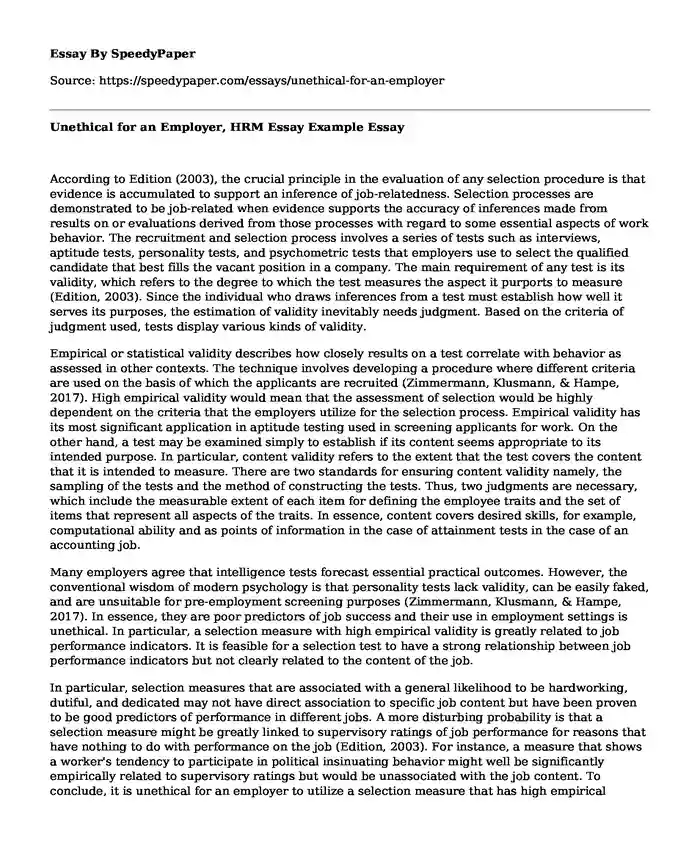
| Type of paper: | Essay |
| Categories: | Management Human resources |
| Pages: | 3 |
| Wordcount: | 622 words |
According to Edition (2003), the crucial principle in the evaluation of any selection procedure is that evidence is accumulated to support an inference of job-relatedness. Selection processes are demonstrated to be job-related when evidence supports the accuracy of inferences made from results on or evaluations derived from those processes with regard to some essential aspects of work behavior. The recruitment and selection process involves a series of tests such as interviews, aptitude tests, personality tests, and psychometric tests that employers use to select the qualified candidate that best fills the vacant position in a company. The main requirement of any test is its validity, which refers to the degree to which the test measures the aspect it purports to measure (Edition, 2003). Since the individual who draws inferences from a test must establish how well it serves its purposes, the estimation of validity inevitably needs judgment. Based on the criteria of judgment used, tests display various kinds of validity.
Empirical or statistical validity describes how closely results on a test correlate with behavior as assessed in other contexts. The technique involves developing a procedure where different criteria are used on the basis of which the applicants are recruited (Zimmermann, Klusmann, & Hampe, 2017). High empirical validity would mean that the assessment of selection would be highly dependent on the criteria that the employers utilize for the selection process. Empirical validity has its most significant application in aptitude testing used in screening applicants for work. On the other hand, a test may be examined simply to establish if its content seems appropriate to its intended purpose. In particular, content validity refers to the extent that the test covers the content that it is intended to measure. There are two standards for ensuring content validity namely, the sampling of the tests and the method of constructing the tests. Thus, two judgments are necessary, which include the measurable extent of each item for defining the employee traits and the set of items that represent all aspects of the traits. In essence, content covers desired skills, for example, computational ability and as points of information in the case of attainment tests in the case of an accounting job.
Many employers agree that intelligence tests forecast essential practical outcomes. However, the conventional wisdom of modern psychology is that personality tests lack validity, can be easily faked, and are unsuitable for pre-employment screening purposes (Zimmermann, Klusmann, & Hampe, 2017). In essence, they are poor predictors of job success and their use in employment settings is unethical. In particular, a selection measure with high empirical validity is greatly related to job performance indicators. It is feasible for a selection test to have a strong relationship between job performance indicators but not clearly related to the content of the job.
In particular, selection measures that are associated with a general likelihood to be hardworking, dutiful, and dedicated may not have direct association to specific job content but have been proven to be good predictors of performance in different jobs. A more disturbing probability is that a selection measure might be greatly linked to supervisory ratings of job performance for reasons that have nothing to do with performance on the job (Edition, 2003). For instance, a measure that shows a worker's tendency to participate in political insinuating behavior might well be significantly empirically related to supervisory ratings but would be unassociated with the job content. To conclude, it is unethical for an employer to utilize a selection measure that has high empirical validity but lacks content validity.
References
Edition, F. (2003). Principles for the Validation and Use of Personnel Selection Procedures.
Zimmermann, S., Klusmann, D., & Hampe, W. (2017). Correcting the predictive validity of a selection test for the effect of indirect range restriction. BMC medical education, 17(1), 246.
Cite this page
Unethical for an Employer, HRM Essay Example. (2022, Apr 28). Retrieved from https://speedypaper.net/essays/unethical-for-an-employer
Request Removal
If you are the original author of this essay and no longer wish to have it published on the SpeedyPaper website, please click below to request its removal:
- Why Pride and Prejudice Is Still Popular Today? Literary Essay Sample
- Franz Schubert and the Peacocks of Benvenuto Cellini - Article Analysis Essay Sample
- Good Officer - Interview Essay Example
- Models of Governance
- Essay Sample: Expansion Into a New National Market
- Paper Example on Happiness: A Destination or an Ongoing Pursuit
- Free Essay Sample on Vitamins, Herbs, and Nutritional Supplements
Popular categories




